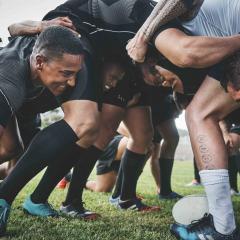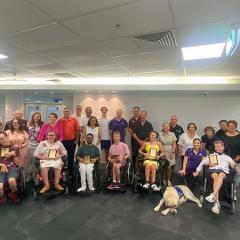 Each month we shine the spotlight on a HDR (Higher Degree by Research) student within the School of Human Movement and Nutrition Sciences.
Each month we shine the spotlight on a HDR (Higher Degree by Research) student within the School of Human Movement and Nutrition Sciences.
This month we caught up with Suzanna Russell, Sport Sciences PhD student, whose research is aimed at maximising athletic performance through examining mental fatigue in elite sport.
What inspired you to undertake a PhD?
During my undergraduate I was involved in several applied sporting and clinical research projects. This allowed me to see other PhD students in action, where I was inspired by the opportunity to spend time exploring a question I wanted to answer to maximise athlete performance.
What are your key research interests?
My key research interests include athlete fatigue and recovery, specifically cognitive performance and fatigue. I see a huge importance in investigating athlete and staff wellbeing and mental health. I particularly enjoy working with team sports with experiences in performance analytics.
What is your PhD research project about?
My PhD project explores mental fatigue in elite sport. The purpose of my research was to translate previous laboratory-based findings to better understand how athletes experience mental fatigue in ecologically valid environments. My thesis incorporated qualitative, observational and longitudinal approaches to justify the need for practitioners to be aware of appropriately monitoring and managing mental fatigue in elite athletes.
What do you enjoy most about being a PhD student?
As a PhD student you are surrounded by other extremely talented and skilled individuals; I thoroughly enjoy interacting with and learning from others with similar, and differing, interests. As an overthinker, I also enjoy the opportunity to challenge myself and think critically to create knowledge and enhance understanding.
What is one piece of advice you would give to someone thinking about studying a PhD?
This is probably the toughest question – as there is a lot I would like to share here!
My number one piece of advice for those thinking about commencing a PhD is invest time into choosing a supervisory team that you know you will work well with your personality, who you will learn from and you aspire to be like.
For those who have just started a PhD, the advice would be to run your own race. Don’t let yourself be defeated by comparing yourself to the successes of those around you; instead celebrate them and use those people as inspiration. Embrace the collaborative network you can build and contribute to.
What three words would you use to describe the life of a PhD student?
Self-directed. Challenging. Fulfilling.
What do you like to do in your spare time when you are not working on your PhD?
Most of my time outside of PhD is spent being outside; cycling, running, taking time out at the beach or on a hike, enjoying the atmosphere sporting games or live gigs.
What are three words your fellow PhD students would use to describe you?
Expressive. Resilient. Collaborative.
Where do you see yourself in 10 years?
Given how much I enjoy research and teaching I hope I am still actively involved with academia. I would also like to continue to relish the thrill experienced when working to positively impact athletes directly. Wherever I end up, I hope I’ll still be enjoying what I do whilst supporting others to perform and achieve.



